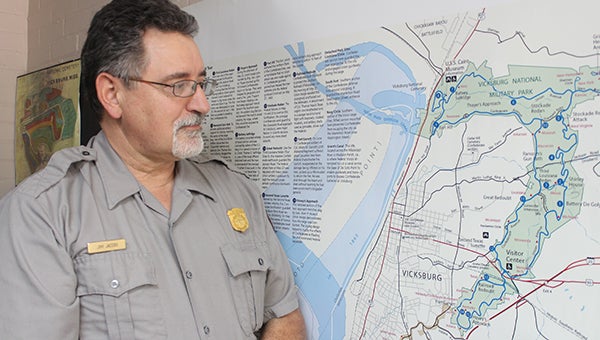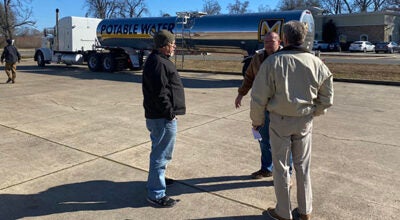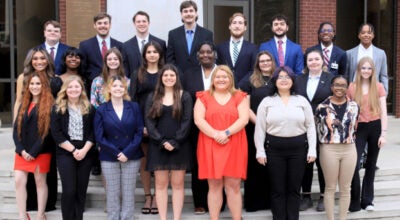Jacobs uses his past to help Vicksburg National Military Park run smoothly
Published 9:53 am Monday, March 21, 2016

- FOND MEMORIES: Jim Jacobs looks over a map of the Vicksburg National Military Park. Jacobs is the park’s facilities manager and chief of maintenance.
March 31, Jim Jacobs, will make his farewells to the staff at the Vicksburg National Military Park and move into retirement after 30 years with the National Park Service, three of those in Vicksburg as facility manager and chief of maintenance, where he oversees the care and maintenance of the parks grounds, its monuments and memorials and facilities.
“Actually, facility manager is a job title,” he said with a grin. “My assistant is also a facility manager. Chief of maintenance means I’m at the top of the facility managers.”
And while his responsibility is keeping the park’s assets in good shape, Jacobs has another responsibility that he calls “my real duties.”
“What I do mostly, is I try to get money for projects,” he said. “I write projects and try to get them funded. That’s my main goal. Other things I get involved with are any programs, any projects or plans or planning we have, like the cultural landscape plan at the cemetery, (and) all the management that’s involved with doing that.”
Jacobs entered the National Park Service as a facilities manager at the St. Louis Arch in St. Louis, a position he took after working as superintendent of grounds, stores and traffic at St. Louis University. His position at the Arch allowed him to use the degree in agriculture with emphasis in horticulture he received from Southeast Missouri State University.
“In St. Louis at the Gateway Arch, we had a pretty elaborate urban landscape,” he said, adding he left the job after 27 years to come to Vicksburg.
“My wife is from Mississippi and her parents live in Hernando, and I didn’t want to spend my whole career at one job at one park,” he said. “The opportunities weren’t there.
“The last two years, I was looking for a job, and I always had my eye on Vicksburg,” he said. “I came here in 2000, and like a lot of other people, I got lost in the park, driving around in circles quite a few times, but I really liked what I saw. I realized, ‘This is a lot of mowing, a lot of tree work, and the monuments.’ Vicksburg was really the only park; I was looking at Vicksburg.”
He said the park was part of the attraction of coming south.
“I really did like this park. This park is important, historically, to the nation,” Jacobs said. “I always knew that. I knew the story, and it’s an honor to work here. I fell in love with the park immediately. This time of the year is a great time to go driving through the park. You get the greening of the grass, but you can still see through the trees and see all the ravines and be able to appreciate how rough that topography is.”
He arrived in time for the park’s Sesquicentennial observance of the Siege of Vicksburg and became involved in the park’s Memorial Day and July 4 celebrations.
Jacobs said his job requires a lot of attention, adding, “If you don’t stay on top of it, you’re in trouble.”
“I have a great staff. My assistant, Gary Lee has been around here a long time; he does pretty much all the first line supervision. He takes care of the operations part of it, and I take care of the project writing and planning part of it,” he said.
“We’ve got quite a few maintenance projects going on now and in the future,” he said. “We’ve got really a lot of money coming into the park. Currently, they’re rehabbing the Missouri Monument. In a couple of years, we’ll have the Wisconsin Monument rehabbed; the Texas Monument and the Pennsylvania Monument, they’re all lined up.”
He said funding for park projects includes assessments and estimates of the projects “and everything is prioritized based on the importance to the park, the importance to the visitor and historic value. It all gets prioritized and the best projects get funded.”
And the funds are not automatically awarded to the park.
“You are definitely in competition (with other parks),” he said. “They’re not going to give one park everything. There are about 62 to 63 parks in this region, and we’re in competition with every one of them for funding.”
There are also different funding sources, and part of Jacobs’ job is to know the sources and how to write the projects so they fit the criteria that source will fund.
“Sometimes it’s that project, sometimes it’s the cost,” he said. “They are very strict with the applications,”
The park has single time to submit its applications, he said, and all projects prioritized and submitted with a requested date, “And you have to request a date starting about two years out and submit a five-year plan. Right now, that plan is from 2018 to 2022. We’re already hooked up for this year and hopefully this year.”
The parks’ Monument preservation program is planned out for the next seven years, he said, and will provide $100,000 a year to hire people part-time and seasonal workers for the project.
“The next year, we’ll concentrate on areas outside the park,” he said. “We’re going to improve Pemberton’s headquarters.”
One obstacle he has to deal with, he said, is bureaucracy involved in getting funding.
“Things don’t happen real fast and you have to jump through hoops. One of the toughest things I had to deal with was getting my correct email. It took me nine months to get my email correct (because it was confused with another federal employee, James Jacobs.)”
He said he hasn’t been able to use his background in horticulture, although he has helped the park with a project to address problems with hazardous trees in the park.
“The turf program here is mow the grass, trim it,” he said. “In St. Louis, I had to deal with mowing and trimming, and seeding and aerating, irrigation and pesticides. If you can’t grow grass down here, you’ve got something wrong. Grass grows here real well.
“The hardest thing for me to get used to was to not get upset when I saw someone park on the grass,” he said. “In St. Louis, I would go ballistic if I saw anyone park on the grass, I didn’t care who it was, because our soil was easily compacted and you would damage the turf. Here, you can park in the same spot day after day, and as long as you give it some sun now and then, the grass is going to grow.”
When he leaves the park for the last time, Jacobs said he plans to move closer to his in-laws in Hernando and get back to the soil.
“I hope to find some land, and I’ll be doing something on that land it will probably be agriculture-related,” he said. “I’m not going to grow row crops, but I’ll be planting something. Maybe I’ll get involved with pest control.”






